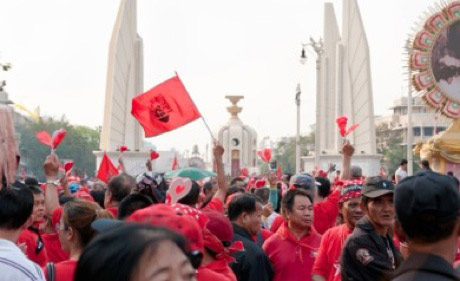Julia: So Todd we're talking about riots. Can you tell me about riots in America? You ever experienced any rioting?
朱莉娅:托德,我们之前谈了骚乱。你能说说美国的骚乱事件吗?你经历过骚乱事件吗?
Todd: There has been a little bit, like there's been riots from, you know, fans going crazy, you know.
托德:美国偶尔有骚乱发生,比如因为球迷非常疯狂而引发的骚乱。
Julia: Oh yeah.
朱莉娅:哦,好。
Todd: After their team won the championship that's usually a problem. Cities sometimes have to be on high alert if their team wins a championship which is absolute idiocy. It's like "hey we won the championship, let's go turn over cars and, you know, burn things." It recently also happened in Canada.
托德:在他们喜欢的球队获得冠军以后,通常会出现问题。如果他们的球队赢得冠军,可能城市都要保持高度戒备状态,因为球迷可能会做出愚蠢的行为。比如,他们会说“嘿,我们赢得了冠军,我们去把汽车掀翻,烧些东西。”最近加拿大也发生过这种事。
Julia: Yes, I remember, yeah.
朱莉娅:对,我记得。
Todd: It's happened in Detroit, it's happened in Dallas. I think the most famous riot we had was the LA riots but that was a long time ago, that was over twenty years ago. Now it's about social unrest.
托德:底特律发生过,达拉斯也发生过。我认为美国最著名的暴乱是洛杉矶暴动,不过那是很长时间以前的事情了,大概是20多年前的事情。现在是社会动荡。
Julia: Yeah.
朱莉娅:对。
Todd: And social injustice for like inner city people but I was in Thailand right when they had their riots.
托德:对贫民区来说是社会不公平,泰国发生暴乱时我就在那里。
Julia: The political riots.
朱莉娅:政治骚乱。
Todd: Yeah, so I actually left the day before they came down and occupied downtown and things got serious.
托德:对,在他们占领市中心前一天,在形势变严重前我离开了那里。
Julia: Wow, and you wouldn't have been able to leave probably if that happened? Did they close the airports?
朱莉娅:哇哦,暴乱发生时就不能离开了吧?他们有关闭机场吗?
Todd: Oh no, I think the airport was still open yeah, yeah, but I did see them every day so I mean before that they would often ride, you know, the red shirts, would ride down and for people listening you had the red shirts who were against the government and they came and they occupied Bangkok and that was quite interesting. But to be honest, I never felt threatened but then again I'd left the day before anything happened so before things turned ugly.
托德:没有,我想机场还是开放的,不过我的确每天都能看到那些人,就是那些穿着红衫的人,他们一路游行示威,我们要解释一下,“红衫军”指的是那些反对政府的人,他们占领了曼谷,这很有意思。说实话,我从未感觉害怕,而且我在发生情况以前、在事态变丑恶的前一天离开了那里。
Julia: And were tourists targeted during those riots?
朱莉娅:这些暴乱有针对游客吗?
Todd: No, not at all. Actually it was weird being a foreigner at the time when all this was going on because you felt like you were at somebody's house when they had a family fight. You know, have you ever been at somebody's house and maybe the daughter gets in a fight with the mother and they get so heated in the argument they forget that you're even there? That's what it was like in Thailand at the time.
托德:没有,完全没有。其实作为外国人来说,在事情发生时我觉得很奇怪,就好像你去别人家里做客而那家人发生了争吵。就好比你去别人家做客时,那家的女儿和妈妈吵了起来,她们吵得非常激烈,以至于她们忘了你还在他们家里。那就是我在泰国动乱发生时的感受。
Julia: So you didn't feel under threat in any way?
朱莉娅:所以你并没有受到威胁?
Todd: Oh no. And actually the red shirt people were trying to be careful not to hurt anybody. The government, the yellow shirt people, were trying to be helpful and not, make sure that no tourists were hurt. It was really an internal fight.
托德:没有,实际上“红衫军”会尽量很小心,不去伤害任何人。而支持政府的“黄衫军”也愿意提供帮助,他们希望确保没有游客受到伤害。这是内部斗争。
Julia: A domestic issue?
朱莉娅:这是国内问题?
Todd: It was a domestic issue and it was quite interesting how both sides took so much care to make sure that no outsiders were harmed even though eventually it turned really violent for each other. So a family squabble you might say.
托德:是国内问题,非常有意思的是,双方都非常小心谨慎,目的是确保外人不会受伤,虽然最后演变成了暴力事件。可以说这是家庭争吵。
Julia: Hmm.
朱莉娅:嗯。

译文属可可原创,仅供学习交流使用,未经许可请勿转载



